- Home
- Peter Straub
The Throat Page 2
The Throat Read online
Page 2
Mr. Schoonhaven sat down, the parish priest stood to give a prayer, and the dinner was over. All the football and baseball players from St. Ignatius and Holy Sepulchre began to move toward the steps up to the nave.
John Ransom asked me if we were supposed to take our plates into the kitchen.
“No, they’ll do it.” I nodded toward the weary-looking women, church volunteers, who were now standing in front of the serving tables. They had cooked for us, and most of them had brought beans and macaroni in covered dishes from their own kitchens. “How did you hear about this, anyhow?”
“I saw an announcement on our notice board.”
“This can’t be much like Brooks-Lowood,” I said.
He smiled. “It was okay. I liked it. I liked it fine.”
We started moving toward the stairs behind the other boys, some of whom were looking suspiciously at him over their shoulders.
“You know, Tim, I enjoyed playing against you,” John Ransom said. He was smiling at me and holding out his hand.
I stared stupidly at his hand for a couple of beats before I took it. At Holy Sepulchre boys never shook hands. Nobody I knew shook hands in this way, socially, unless they were closing a deal on a used car.
“Don’t you love being a lineman?” he asked.
I laughed and looked up from the spectacle of our joined hands to observe the expressions on the faces of Father Vitale and a few of the women volunteers. It took me a moment to figure out this expression. They were looking at me with interest and respect, a combination so unusual in my experience as to be rare. I understood that neither Father Vitale nor the volunteers had ever had much contact with someone like John Ransom; to them it looked as if he had come all the way from the east side just to shake my hand.
No, I wanted to protest, it’s not me. Because I finally understood: every year, Holy Sepulchre sent out flyers about the Christian Athletes’ Fellowship Dinner to every high school in the city, and not only was John Ransom the first Brooks-Lowood student who had ever come, he was the only student from the entire east side who had ever been interested enough to attend the football supper. That was the point: he was interested.
The other boys were already up in the church vestibule by the time John Ransom and I reached the bottom of the stairs. I could hear them laughing about Mr. Schoonhaven. Then I heard the voice of Bill Byrne, who weighed nearly three hundred pounds and was the Bluebirds’ center, saying something about a “dork tourist,” and then, even more horribly, “some east side fag who showed up to suck Underhill’s dick.” There was a burst of dirty laughter. It was just aimless, all-purpose hostility, but I almost literally prayed that John Ransom had not heard it. I didn’t think a well-dressed handshaking boy like John Ransom would enjoy being called a pervert—a fairy, a queer, a cocksucker!
But because I had heard it, he had too, and from the hiss of indrawn breath behind me, so had Father Vitale. John Ransom surprised me by laughing out loud.
“Byrne!” shouted Father Vitale. “You, Byrne!” He put one hand on my right shoulder and the other on John Ransom’s left and shoved us apart so that he could push between us. My classmates opened the creaking side door onto Vestry Street as Father Vitale squeezed into the space between John Ransom and myself. He had forgotten we were there, I think, and his big swarthy face moved past mine without a glance. I could see enormous black open pores on his nose, as if even his skin was breathing hard, stoking in air like a furnace. He was panting by the time he got to the top of the stairs. The stench of cigarettes followed him like a wake.
“That priest smokes too much,” John Ransom said.
We reached the top of the steps just as the door slammed shut again, and we walked through the vestibule, hearing running footsteps on Vestry Street and the priest’s yells of Boys! Boys!
“Maybe we should give him a minute,” John Ransom said. He put his hands in his pockets and ambled off toward the arched entrance to the interior of the church.
“Give him a minute?” I asked.
“Let him catch his breath. He certainly isn’t going to catch them.” John Ransom was gazing appreciatively into the long, dim length of Holy Sepulchre. He might have been in a museum. I saw him take in the font of holy water and the ranks of flickering, intermittent candles, some new, some guttering nubs. Ransom looked into the depths of our church as if he were memorizing it: he wasn’t smiling anymore, but his evident pleasure was not in any way diminished by the reappearance of Father Vitale, who came back in through the Vestry Street door and huffed and puffed like a tugboat through the gray air. He did not speak to either of us. As he moved down the aisle, Father Vitale almost instantly lost his individuality and became a scenic element of the church itself, like a castle on a German cliff or a donkey on a dusty Italian road. I was seeing Father Vitale as John Ransom saw him.
He turned around and inspected the vestibule in the same way, as if seeing it was understanding it. He was not the supercilious tourist for whom I had mistaken him. He wanted to take it in, to experience it in a way that would probably not have occurred to any other Brooks-Lowood boy. I thought that John Ransom would have taken that same attitude to the bottom of the world.
Later, John Ransom and I both went to the bottom of the world.
When I was seven years old, my sister April was killed—murdered. She was nine. I saw it happen. I thought I saw something happen. I tried to help her. I tried to stop whatever it was from happening, and then I was killed too, but not as permanently as April.
I guess I think the bottom of the world is the center of the world; and that sooner or later we all see it, all of us, according to our capacities.
The next time I saw John Ransom was in Vietnam.
3
TEN MONTHS AFTER I GRADUATED from Berkeley, I was drafted—I let it happen to me, not out of any sense that I owed my country a year of military service. Since graduating I had been working in a bookstore on Telegraph Avenue and writing short stories at night. These invariably came back in the stamped, self-addressed manila envelopes I had folded inside my own envelopes to the New Yorker and Atlantic Monthly and Harpers—not to mention Prairie Schooner, The Kenyon Review, Antaeus, The Massachusetts Review, and Ploughshares. At least I think it was Ploughshares. I knew that I did not want to teach, and I had no faith that teaching deferments would hold (they didn’t). The more that my stillborn stories came back to me, the more discouraging it became to spend forty hours a week surrounded by other people’s books. When my 2-S classification was adjusted to 1-A, I felt that I might have been given a way out of my impasse.
I flew to Vietnam on a commercial airline. About three-fourths of the passengers in tourist class were greenhorns like me, and the stewardesses had trouble looking at us directly. The only really relaxed passengers in our section of the plane were the weather-beaten lifers at the back of the cabin, noncoms, who were as loose and clubby as golfers on a weekend flight to Myrtle Beach.
In the first-class cabin at the front of the plane sat men in dark suits, State Department functionaries and businessmen making a good thing for as long as they could out of cement or building supplies in Vietnam. When they looked at us, they smiled—we were their soldiers, after all, protecting their ideals and their money.
But between the patriots at the front and the relaxed, disillusioned lifers at the rear, in two rows just aft of first class, was another group I could not figure out at all. As a group, they were lean, muscular, short-haired, like soldiers, but they wore Hawaiian shirts and khaki pants, or blue button-down shirts with crisp blue jeans. They looked like a college football team at a tenth-year reunion. These men took no notice of us at all. What language I overheard was bright, hard-edged military jargon.
When one of the lifers walked past my seat, stretching his legs before going to sleep, I touched his wrist and asked him about the men at the front of the cabin.
He bent low and squeezed out a single word.
Greenies?
We landed at Tan
Son Nhut in sunlight that seemed almost visibly dense. When the stewardess swung open the jet’s door and the astonishing heat rolled in, I felt that my old life had gone forever. I thought I could smell the polish melting off my buttons. In that moment I decided not to be afraid of anything until I really had to be—I felt that it was possible to step away from my childhood. This was the first of the queer exaltations—the sudden sense of a new freedom—that sometimes visited me in Vietnam, and which I have never felt elsewhere.
My orders sent me to Camp White Star, a base in II Corps located outside of Nha Trang. There I was supposed to join other new members of my regiment for transport north to Camp Crandall in I Corps. One of the unexplained glitches not unusual in army life occurred, and the men I was supposed to join had been sent on ahead of me. I was left awaiting orders for eight days.
Every day I reported to a cynical captain named McCue, Hamilton McCue, who rubbed his square fingers over his babyish pink cheeks and assigned me to whatever task took his momentary fancy. I moved barrels from beneath the latrine and poured kerosene into them so old Vietnamese women could incinerate our shit; I cannibalized broken-down jeeps for distributor caps, alternators, and working fuel pumps; I raked stones out of the fifteen square yards of dust in front of the officers’ club. Eventually McCue decided that I was having an unseemly amount of fun and assigned me to the body squad. The body squad unloaded corpses from the incoming helicopters, transferred them to the “morgue” while the paperwork was done, and then loaded them into the holds of planes going to Tan Son Nhut, where they were flown back to the States.
The other seven members of the body squad were serving out their remaining time in Vietnam. All of them had once been in regular units, and most of them had re-upped so that they could spend another year in the field. They were not ordinary people—the regiment had slam-dunked them into the body squad to get them out of their units.
Their names were Scoot, Hollyday, di Maestro, Picklock, Ratman, Attica, and Pirate. They had a generic likeness, being unshaven, hairy—even Ratman, who was prematurely bald, was hairy—unclean, missing a crucial tooth or two. Scoot, Pirate, and di Maestro wore tattoos (BORN TO DIE, DEALERS IN DEATH, and a death’s head suspended over an umber pyramid, respectively). None of them ever wore an entire uniform. For the whole of my first day, they did not speak to me, and went about the business of carrying the heavy body bags from the helicopter to the truck and from the truck to the “morgue” in a frosty, insulted silence.
The next day, after Captain McCue told me that my orders still had not come through and that I should return to the body squad, he asked me how I was getting on with my fellow workers. That was what he called them, my “fellow workers.”
“They’re full of stories,” I said.
“That’s not all they’re full of, the way I hear it,” he said, showing two rows of square brown teeth that made his big cheeks look as if his character were being eroded from within. He must have seen that I had just decided I preferred the company of Ratman, Attica, and the rest to his own, because he told me that I would be working with the body squad until my orders came through.
On the second day, the intensity of my new comrades’ disdain had relaxed, and they resumed the unfinishable dialogue I had interrupted.
Their stories were always about death.
“We’re pounding the boonies,” Ratman said, shoving another wrapped corpse into the back of our truck. “Twenty days. You listening, Underdog?”
I had a new name.
“Twenty days. You know what that’s like out there, Underdog?”
Pirate spat a thick yellow curd onto the ground.
“Like forty days in hell. In hell you’re already dead, but out in the boonies everybody’s trying to kill you. Means you never sleep right. Means you see things.”
Pirate snorted and tossed another body onto the truck. “Fuckin’ right.”
“You see your old girlfriend fuckin’ some numbnuts fuck, you see your fuckin’ friends get killed, you see the fuckin’ trees move, you see stuff that never happened and never will, man.”
“ ’Cept here,” Pirate said.
“Twenty days,” Ratman said. The back of the truck was now filled with bodies in bags, and Ratman swung up and locked the rear panel. He leaned against it on stiff arms, shaking his drooping head. His fingertips were bulbous, the size of golf balls, and each came to a pointed tip at the spot where his fingerprints would have been centered. I found out later that he had earned his name by eating two live rats in a tunnel where his platoon had found a thousand kilos of rice. “Too fat for speed,” he was supposed to have said.
“Every sense you got is out there, man, you hear a mouse move—”
“Hear rats move,” di Maestro said, slapping the side of the truck as if to wake up the bodies in the green bags.
“—hear the dew jumpin’ out of the leaves, hear the insects moving in the bark. Hear your own fingernails grow. Hear that thing in the ground, man.”
“Thing in the ground?” Pirate asked.
“Shit,” said Ratman. “You don’t know? You know how when you lie down on the trail you hear all kinds of shit, all them damn bugs and monkeys, the birds, the people moving way up ahead of you—”
“Better be sure they’re not coming your direction,” di Maestro said from the front of the truck. “You takin’ notes, Underdog?”
“—all kinds of shit, right? But then you hear the rest. You hear like a humming noise underneath all them other noises. Like some big generator’s running way far away underneath you.”
“Oh, that thing in the ground,” Pirate said.
“It is the ground,” said Ratman. He stepped back from the truck and gave Pirate a fierce, wild-eyed glare. “Fuckin’ ground makes the fuckin’ noise by itself. You hear me? An’ that engine’s always on. It never sleeps.”
“Okay, let’s move,” di Maestro said. He climbed up behind the wheel. Hollyday, Scoot, and Attica crowded into the seat beside him. Ratman scrambled up behind the cab, and Picklock and Pirate and I followed him. The truck jolted down the field toward the main body of the camp, and the helicopter pilot and some of the ground crew turned to watch us go. We were like garbagemen, I thought. It was like working on a garbage truck.
“On top of which,” Ratman said, “people are seriously trying to interfere with your existence.”
Picklock laughed, but instantly composed himself again. So far, neither he nor Pirate had actually looked at me.
“Which can fuck you up all by itself, at least until you get used to it,” Ratman said. “Twenty-day mission. I been on longer, but I never went on any worse. The lieutenant went down. The radio man, he went down. My best friends at that time, they went down.”
“Where is this?” Pirate asked.
“This is Darlac Province,” said Ratman. “Not too damn far away.”
“Right next door,” said Pirate.
“Twentieth day,” said Pirate. “We’re out there. We’re after some damn cadre. Hardly any food left, and our pickup is in forty-eight hours. This target keeps moving, they go from ville to ville, they’re your basic Robin Hood-type cadre.” Ratman shook his head. The truck hit a low point in the road on the outskirts of the base, and one of the bags slithered down the pile and landed softly at Ratman’s feet. He kicked it almost gently.
“This guy, this friend of mine, name of Bobby Swett, he was right ahead of me, five feet ahead of me. We hear some kind of crazy whoop, and then this big red-and-yellow bird flashes past us, big as a turkey, man, wings like fuckin’ propellers, man, and I’m thinkin’, okay, what woke this mother up? And Bobby Swett turns around to look at me, and he’s grinnin’. His grin is the last thing I see for about ten minutes. When I come to I remember seeing Bobby Swett come apart all at once, like something inside him exploded, but—you get it?—I’m remembering something I didn’t really see. I think I’m dead. I fucking know I’m dead. I’m covered in blood and this brownskin little girl is bending over m
e. Black hair and black eyes. So now I know. There are angels, and angels got black hair and black eyes, hot shit.”
A brown wooden fence hid the long low shed we called the morgue, and when we had passed the stenciled GRAVES REGISTRATION sign, Ratman vaulted off the back of the truck and opened the storage bay. We had four hours turnaround time, and today there were a lot of bodies.
Di Maestro backed the truck up into the bay, and we started hauling the long bags into the interior of the shed.
“Long nose?” asked Pirate.
“Long nose, shit yes.”
“A Yard.”
“Sure, but what did I know? She was a Rhade—most of the Yards in Darlac Province, of which they got about two thousand, are Rhade. ‘I died,’ I say to this girl, still figuring she’s a angel, and she coos something back at me. It seems to me that I can remember this big flash of light—I mean, that was something I actually saw.”
“Good ol’ Bobby Swett tripped a mine,” said Pirate.
I was getting to like Pirate. Pirate knew I was the real subject of this story, and he was selfless enough to keep things rolling with little interjections and explanations. Pirate was slightly less contemptuous of me than the rest of the body squad. I also liked the way he looked, raffish without being as ratlike as Ratman. Like me, Pirate tended toward the hulking. He seldom wore a shirt in the daytime, and always had a bandanna tied around his head or his neck. When I had been out in the field for a time, I found myself imitating these mannerisms, except for when the mosquitos got bad.
“You think I don’t know that? What I’m saying is”—Ratman shoved another dead soldier in a zippered bag into the darkness of the shed—“what I’m sayin is, I was dead too. For a minute, maybe longer.”
“Of what?”
“Shock,” Ratman said simply. “That’s the reason I never saw Bobby Swett get blown apart. Didn’t you ever hear about this? I heard about it. Lotsa guys I met, it happened to them or someone they knew. You die, you come back.”

 Poe's Children: The New Horror: An Anthology
Poe's Children: The New Horror: An Anthology Koko
Koko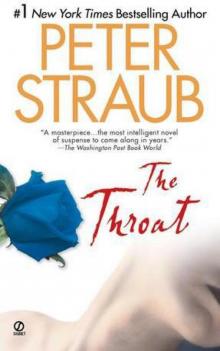 The Throat
The Throat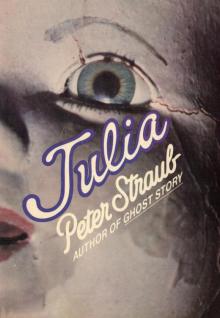 Julia
Julia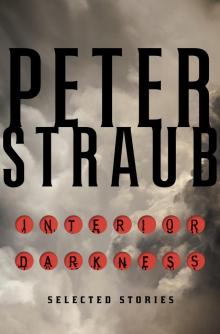 Interior Darkness: Selected Stories
Interior Darkness: Selected Stories A Dark Matter
A Dark Matter Floating Dragon
Floating Dragon Houses Without Doors
Houses Without Doors Mr. X
Mr. X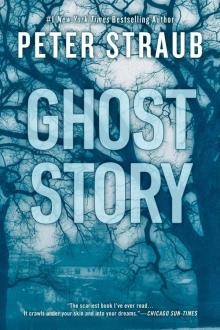 Ghost Story
Ghost Story Mystery
Mystery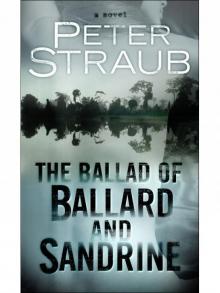 The Ballad of Ballard and Sandrine
The Ballad of Ballard and Sandrine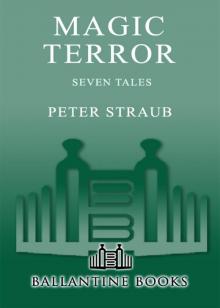 Magic Terror
Magic Terror In the Night Room
In the Night Room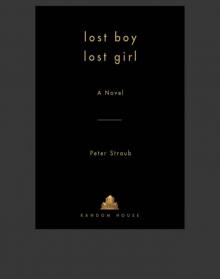 Lost Boy Lost Girl
Lost Boy Lost Girl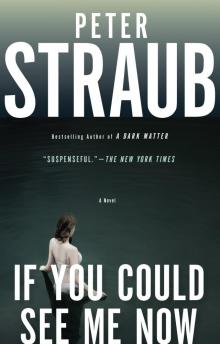 If You Could See Me Now
If You Could See Me Now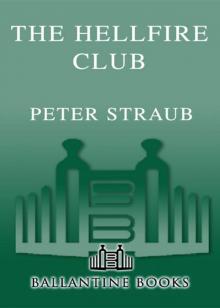 The Hellfire Club
The Hellfire Club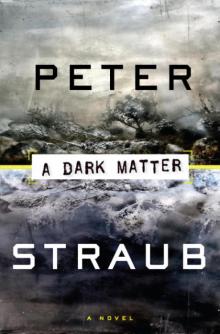 A Dark Matter: A Novel
A Dark Matter: A Novel Koko brt-1
Koko brt-1 Shadowland
Shadowland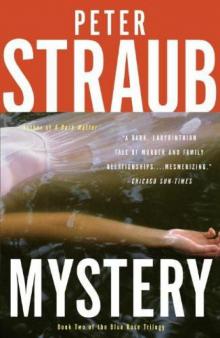 Mystery brt-2
Mystery brt-2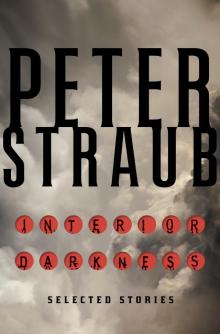 Interior Darkness
Interior Darkness Poe's Children
Poe's Children